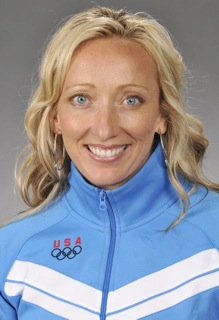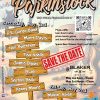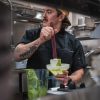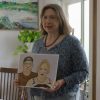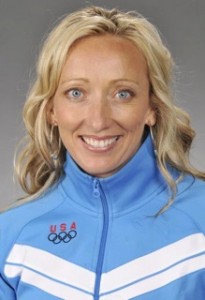
George Lucas, American Graffiti, Carol Channing and Royal Robbins, superstars …
Modesto is in the groove right now for international celebrity. Besides being known as the home of George Lucas, American Graffiti, Carol Channing and Royal Robbins, superstars like Tim Olyphant, Jeremy Renner and James Marsters are all on the big and little screen. Our local athletes like Ali Cox,Erin Cafaro and Tisha Venturini have conquered around the world. One of our local athletes walks among us daily, all the while, planning her return to the Olympic stage. Suzy Powell, world famous athlete, 3 time Olympian, full time Rotarian, and regular Modesto citizen agreed to spend some time with ModestoView. Let’s get to know Suzy.
MV: OK, why the discus?
Suzy Powell: My career began at age ten while running for a local track club. My father noticed my ability to throw things far and suggested throwing the discus. I tried the discus throw if only to please my dad.
MV: Is there something that inspired you, as this is one of the original ancient Olympic events?
SP: Not at first, I just enjoyed throwing things, pleasing my dad, and Slurpees after practice when I threw well.
MV: When you were 5, what did you want to be when you grew up?
SP: Wow! Pretty sure I thought my sister and Fonzie from “Happy Days” were the two coolest people, so maybe some sort of hybrid of the two.
MV: When did you first know that you would want to/ or could be an Olympic caliber athlete.
SP: I distinctly remember watching the 1984 LA Olympics at my friend’s house. I must have been 7 years old (September birthday), and I remember watching Carl Lewis and Jackie Joyner Kersee perform. It was the first time I understood what the Olympic Games were all about. I was fascinated by the magnitude of the event, it seemed like such an important event.
The first time I started to know I could or would be an Olympian was my freshman year at Downey. My freshman summer (1991) at 14 years old, I made the Junior National Team (19yrs old and under to be considered a Junior). I was on the team with mostly college freshman, so people five years older. The team spent 21 days in Europe with the final meet in Salamanca, Spain. If you recall, the 1992 Olympics were in Barcelona, and so the whole country was preparing and excited. In fact, ourcompetition in Spain was a practice or dress rehearsal for the Spanish officials and meet management. It was that summer when I thought that maybe the 1996 Olympics could be a reality for me.
MV: How has your life changed since you became an Olympian?
SP: I remember when I made my first Olympic Team in 1996. I was 19 and had just finished my sophomore year at UCLA. After the competition, I was having dinner with my family, and my sister in law said, “your life just changed forever, today.” In the whirlwind of excitement of making the team just a few hours before, I had not even considered what just happened. She was right, my life would change forever, I would now be known as an Olympian. People ascribe a certain respect and esteem for that particular achievement. Why else would you be interviewing me today?
In terms of financial rewards, however, becoming an Olympian did not change a single thing. I wasstill a scholarship athlete at UCLA, and thus could not accept financial rewards for competing, as it would have jeopardized my NCAA eligibility. In the world of discus throwing, it’s a far better idea to respect your scholarship obligations, finish your education, and worry about “making money” in the sport with a college degree in your hand.
MV: What is the toughest part about training for Olympic level competition?
SP: Being able to work hard and make sacrifices toward accomplishing a desired outcome, when current circumstances or situations do not support your vision. Simply put, having faith in the process. For me this requires much prayer and faith in God.
MV: What is the hardest thing to give up when you are in the serious training mode?
SP: Time with family and friends. Training and competing requires travel and intense focus. It’s impossible to be present or available for every family function or party when I am in this mode.
MV: What frustrates you the most?
SP: That there is only 24 hours in a day, I have a tendency to over-schedule myself.
MV: Where is the most beautiful place you have every competed?
SP: Let’s see, in terms of stadium settings, I would have to say Rethymno, Crete at the University of Crete, Greece. Although the stadium is modest, it is on a hill overlooking the Mediterranean Sea.
MV: When you are on the road at meets, what do you miss most about Modesto?
SP: My husband, Tim, and our two dogs, Miss Daisy and Mr. B.
MV: What do you think will give you that extra special edge as you train for 2012?
SP: It is a combination of things: desire, experience, family support, and support from people and businesses in our city.
MV: Secret Favorite Junk food?
SP: I feel as though I am confessing to a crime. Let me put it this way, if we are at the cabin during a nice summer weekend, and there is a box of Cheese-Its hanging around, chances are good I will destroy that box!
MV: Did you ever cruise in Modesto?
SP: Not on purpose.
MV: When you travel, what do people think about Modesto?
SP: It really depends on where I am in. In foreign countries, most people have never heard of Modesto, so near San Francisco usually helps people understand. My favorite scenario is when they (people unfamiliar with Modesto) get our wine growing region confused with Napa, and you know what? I just go with it!
MV: Are you excited that Modesto is the home of American Graffiti?
SP: I understand the older generations really love and identify with that part of Modesto history. As for me, well, not so much. I think my generation maybe missed the boat on the true American Graffiti experience. I think it is nice that our town has something positive to hang its hat on, but it’s just not me. I get more excited that Modesto is home to great companies and like Gallo Wine, Foster Farms, Tactical 5.11, Prime Shine, Don’s Mobile Glass, Pacific Southwest Container, Gallo Center for the Arts, and, of course, our world famous agriculture industry.
MV: What is your idea of the perfect evening in Modesto?
SP: Dinner with my husband at one of our excellent downtown restaurants, then a show at the Gallo Center, and last but certainly not least, Bananas Foster at DEWZ. It is the best dessert known to man, especially if Scott starts getting fancy with the sauce making. Also, an evening on the Party Deck at the Nuts game is a great way to spend a summer evening Modesto.
MV: What advice would you give to the aspiring athlete?
SP: If you really want to be a champion in your sport (business, life, etc), you must dedicate every fiber of your being to the endeavor. You must become a student of the sport. You must be willing to endure and suffer to achieve greatness. In the words of my dad, “if it was easy, everyone would be doing it!” The modern world allows us to download and view almost any piece of information at any time, on anywhim. Success is not like this. To become an expert or champion in anything, you must pay the price, the price being time, energy and resources (read money). Read the book Outliers, and become familiar with the rule of 10,000.
MV: Tell us about your post competitive life, what do you want to be when you grow up?
SP: Last year I sustained a major ankle injury, it was the first since I was ten years old that I did not have a competitive track season. In some ways, it was wonderful! I was not tired all the time, I could go hiking with my husband, I did projects around the house. I started a fitness business here in Modesto, using a boot camp format, which I still do. I joined a few service clubs like Modesto Rotary and Common Wealth Modesto. It was like discovering the aliens from Avatar, a whole new world opened up. So, although I am completely focused on the London Olympics, I am looking forward to life after track and field. I see myself expanding my business plan to include the training of elite athletes, and public speaking. My husband and I also would like to start a family. It’s great to be at a point in your life where you know you are closing a chapter, and a truly wonderful chapter, but also that the best in life is yet to come.
MV: What is on your Ipod as you get in the groove for a throw?
SP: It changes, check back with me in May. It’s usually something a little mellow. Discus throwers need to be in a calm, Zen- like state, so my music usually reflects that.
MV: Beatles or Stones?
SP: Beatles, hands down! Although I must say I am amazed how the Stones, after abusing their bodies for so many years, manage to defy modern science by continuing to live.


